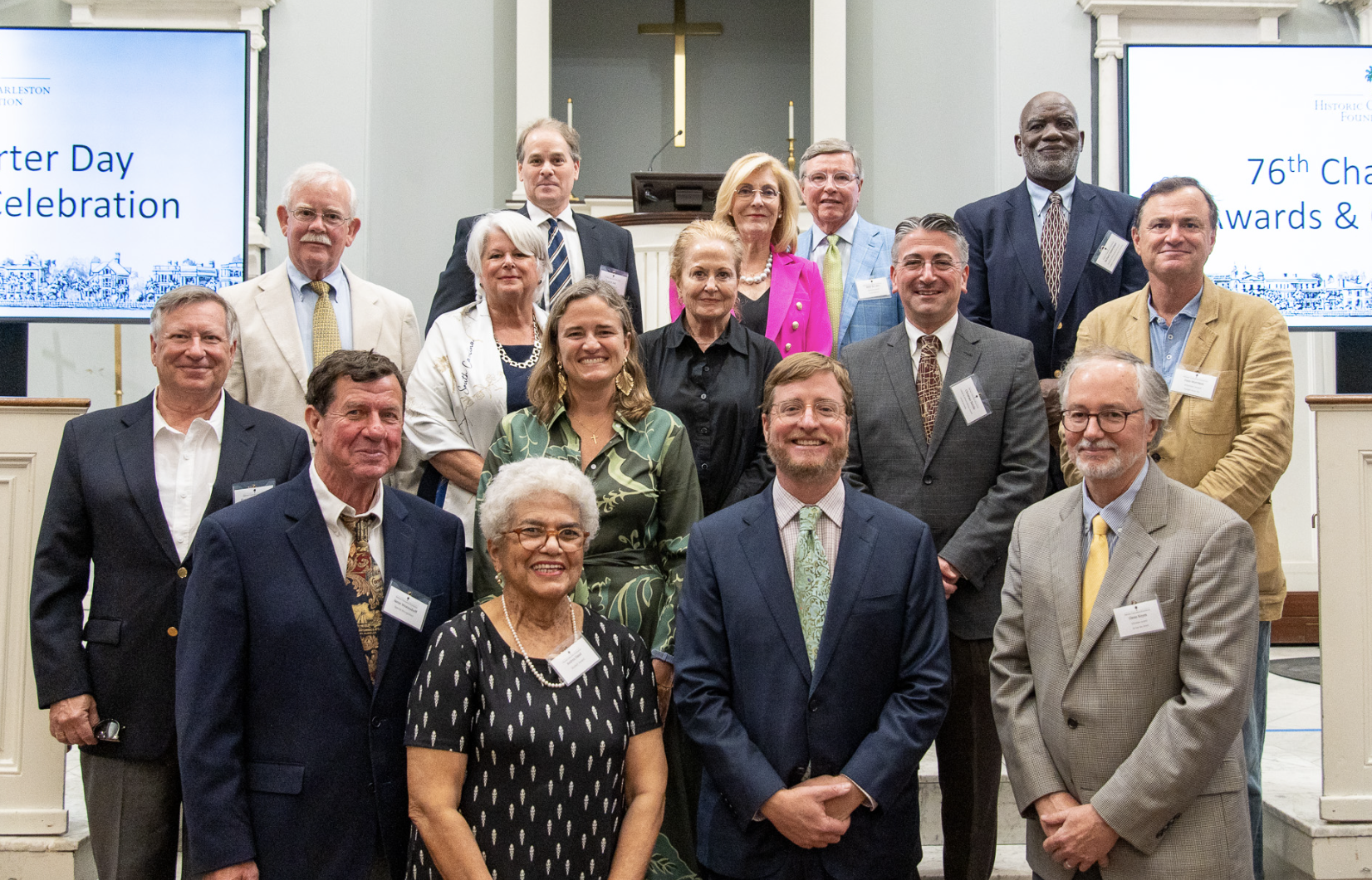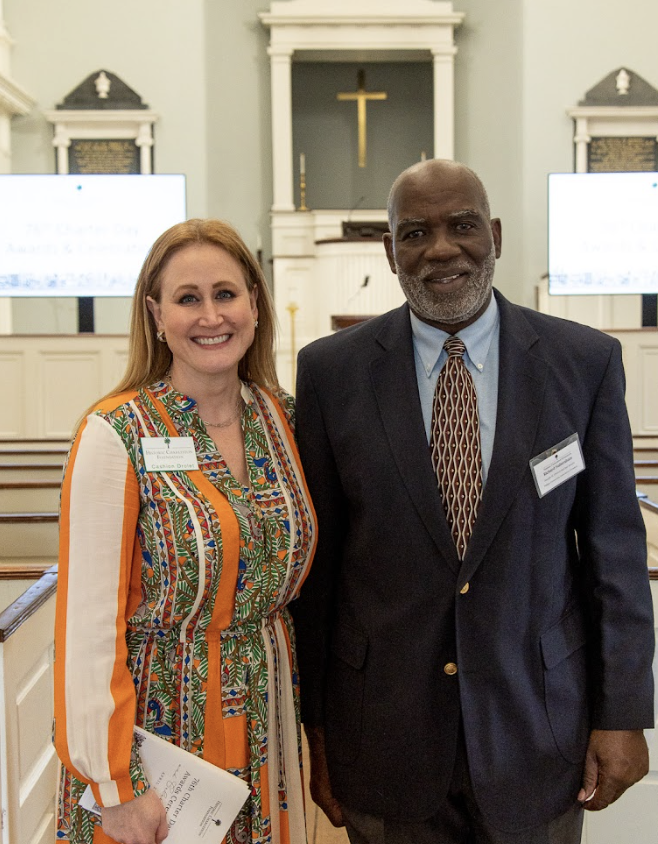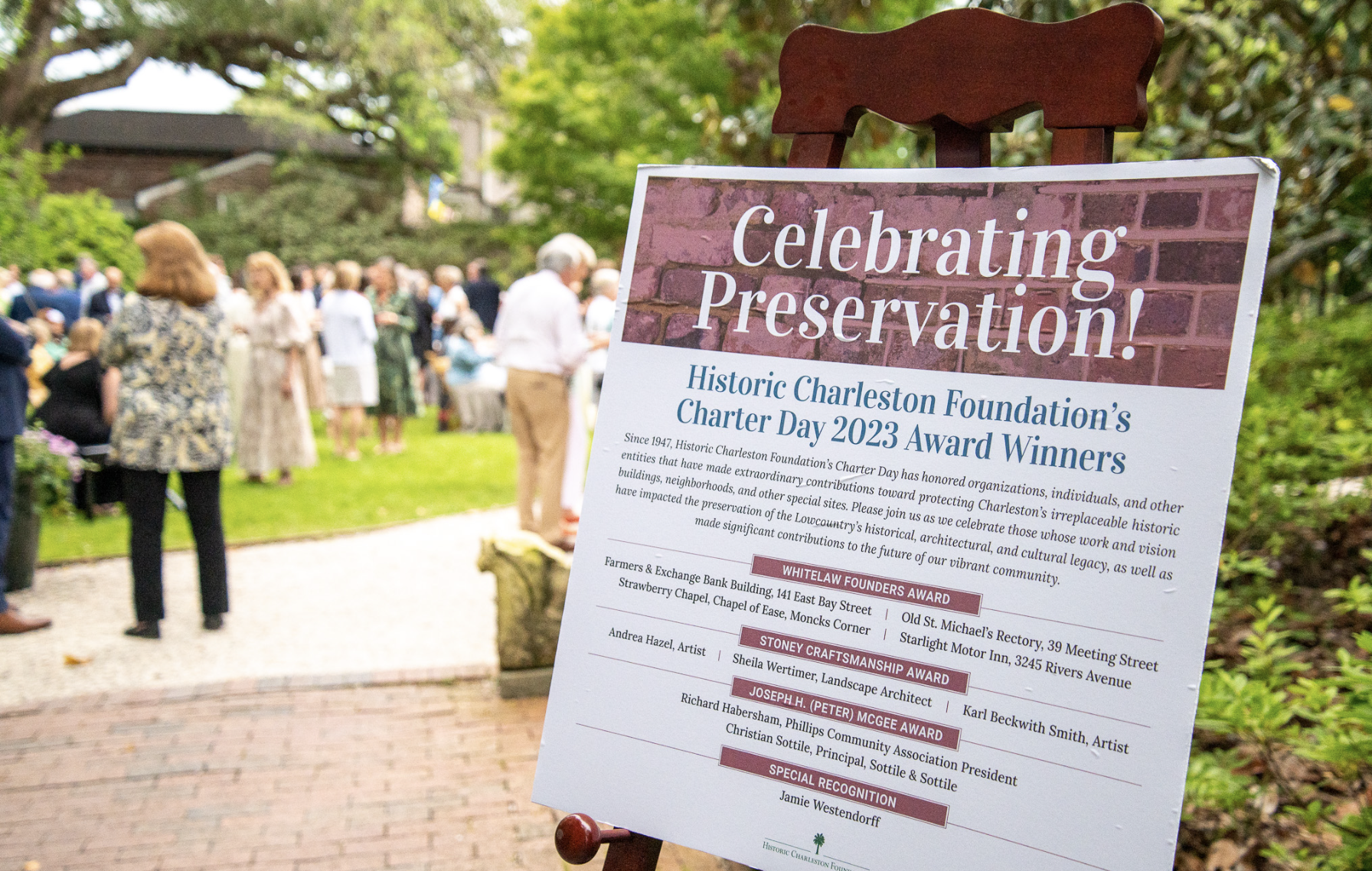Historic Charleston Foundation celebrates achievements in preservation with Charter Day Winners
May 2, 2023

This April, Historic Charleston Foundation commemorated its 1947 founding by honoring extraordinary contributions in preserving Charleston’s irreplaceable built environment and cultural character during Charter Day. This annual event honors and celebrates individuals and organizations who are instrumental to the past, present, and future authenticity of Charleston and the Lowcountry. Annual awards include the Stoney Craftsmanship Award and the Whitelaw Founders Award. NEW for 2023, HCF is proud to also unveil the Joseph H. (Peter) McGee Award with two deserving award winners.
An awards ceremony was held at the historic First Baptist Church with a reception at the Nathaniel Russell House on Thursday, April 27. The event was attended by award winners, family and members of the community including Joseph H. (Peter) McGee and family. Congratulations to all of the 2023 Charter Day award winners.
The Stoney Craftsmanship Award recognizes craftspeople who have kept alive Charleston’s tradition of excellence in the building trades.
Winners:
- Andrea Hazel, artist: Andrea Hazel was born and raised in Charleston, SC. She taught math at Trident Technical College for many years and Andrea Hazel Photography, until her retirement in 2001. Her most recent collection is titled “How It Was…Charleston in 1963.” This collection depicts various buildings in Charleston that were lost to development. Many of the paintings in this collection depict surveyors taking measurements for the construction of Interstate 26 and the Crosstown. At least 150 structures would be demolished to make way for this new construction. Photographs of these lost structures are housed in the archives of Historic Charleston Foundation and were used as the inspiration for this collection. Along with capturing the buildings that were lost to development, Andrea does an excellent job of capturing the spirit and culture of families and residents that were forcibly rehomed due to this construction.
- Karl Beckwith Smith, artist: Karl Beckwith Smith is an artist and painter who works extensively in the Charleston historic district. He moved to Charleston in 1992 when he established Halcyon Place Gallery on Wentworth St and a design studio on Folly Beach. Most recently, Karl was commissioned by HCF to conduct the research, design, and painting of a custom floorcloth for the entry hall at the Nathaniel Russell House. Though his work spans the globe, Smith’s body of work locally includes extensive interior painting at the French Huguenot Church and myriad of private residences across the historic district.
- Sheila Wertimer, landscape architect: Working for over 40 years in the field of landscape architecture, Sheila has designed and curated literally hundreds of gardens in the Lowcountry. Her innovative, award-winning designs are noted for their sensitivity to Charleston’s historic fabric, use of native plants, and the enticing environment her gardens impart. Sheila began her career in Charleston in 1979, serving as the official Landscape Architect for the City of Charleston. Her revival of Briggs’ original plans can be seen at notable structures such as the William Elliot House, cited as one of Charleston’s oldest surviving single houses, and the Nathaniel Russell House. Sheila Wertimer has also played an instrumental role in the landscapes and gardens at larger historic sites such as HCF’s easement properties at Mulberry Plantation and McLeod Plantation.
The Whitelaw Founders Award recognizes individuals, groups, or government entities that actively engage in the long-term preservation of important buildings and places.
Winners:
- Farmers and Exchange Bank Building, 141 East Bay Street: The Farmers’ and Exchange Bank Building is a historic commercial building designed by Edward C. Jones and Francis D. Lee in 1853 and was completed in 1854. Its Moorish Revival architectural style is distinctive for Charleston. The building was threatened by demolition to become a parking lot until it was purchased and restored in 1970. It was designated a National Historic landmark in 1973. In the early 1990s the building was rehabilitated for use as a restaurant, though it has been vacant since the early 2000s. Sold to a preservation-minded buyer in 2019, the Bank has undergone a significant rehabilitation and renovation by Huss Construction.
- Strawberry Chapel of Ease: The Wardens and Vestry of Strawberry Chapel (built c. 1725) have executed a “once in a century” restoration of their beloved chapel. Strawberry Chapel is the only remaining structure from the 1707 Childsbury settlement. Built as a chapel of ease in 1725 as part of the St. John’s Berkeley Parish, it is located at present-day Cordesville in Berkeley County.
- Starlight Motor Inn, 3245 Rivers Avenue: Built in 1961 on the site of Woody Rogers’s old Studebaker dealership, The Starlight Motor Inn has been a landmark in this North Charleston neighborhood for over 60 years. Recognized as the first modular-built motel in the South, The Starlight was conceived as an affordable and accessible destination for everyday Americans and for decades lived up to its original name, “The Host of America.” In 2020 the building was added to the National Register of Historic Places in recognition of its revolutionary modular construction. In 2022 almost every detail has been restored or preserved, including the Burgundy Lounge, the hotel bar that is still adorned with the original booths, tables, barstools, and chairs. Owned and operated by a Charleston native, The Starlight welcomes visitors, and locals alike to stay, swim, dine, and drink.
- Old St. Michael’s Rectory, 39 Meeting Street: The dwelling at 39 Meeting Street is known as the “Old St. Michael’s Rectory” and it was built in the late 1760s as the first minister’s house for the new St. Michael’s Parish. The surviving church minutes and accounts record the purchase of the lot from Miles Brewton and the bidding for construction of the building by the architectural partnership of Miller and Fullerton. These house builders built several substantial residences in Charleston, including the Edward Rutledge House at 117 Broad Street. Through the stewardship of its current owners, Mike, and Jane McLain, 39 Meeting Street has undergone considerable rehabilitation work over the last two years to bring the house back to a condition that highlights its long history as a renowned example of a Charleston Single House.
In 2023, Historic Charleston Foundation is proud to create a new award named for Joseph H. (Peter) McGee past HCF Chairman and notable preservation advocate. The Joseph H. (Peter) McGee Award recognizes excellence in advocacy, community preservation and planning.
Winners:
-

HCF Chief of Advocacy Cashion Drolet and Richard Habersham
Richard Habersham, Phillips Community Association President: For more than 20 years, Mr. Habersham has fought to protect the Phillips Community from the threats of suburban sprawl, transportation, and infrastructure projects and now, Phillips is among the most remarkably preserved settlement communities in the Lowcountry. Mr. Habersham has led the Phillips Community in its successful fights against the widening of Highway 41 to 5-lanes through the community and multiple annexation attempts. He played the lead role in making Phillips the first historic district in Charleston County and is a key driver of the nomination for Phillips to be listed on the National Register, a national precedent-setting nomination. Habersham defines the community-led preservation movement and has blazed the trail for many other settlements seeking to preserve their communities, including 10-Mile, Beefield, and Red Top.
- Christian Sottile, architect and urban designer, Sottile & Sottile: A principal at Sottile & Sottile in Savannah, GA, Christian Sottile is an internationally award-winning architect and urban designer. His experience includes master planning in nationally registered historic districts, regional planning and master planning for new towns, community-wide workshops, stakeholder engagement, historic research, urban analysis, redevelopment, infill, and revitalization programs. Christian Sottile does not shy away from taking risks on beautiful architecture using the highest-quality materials, including his designs for Courier Square Phase II, the hotel proposed for the Morris Sokol site, and the project at 655 East Bay Street, as well as his collaborations with the American College of the Building Arts.
In 2023, the Foundation is proud to present a Special Recognition Award to Mr. Jamie Westendorff, owner and operator of Charleston Outdoor Catering.
- Jamie Westendorff is the epitome of generosity, regularly donating food and catering services to those in need. Through his catering company Jamie has served an incredible number of organizations including but not limited to: American Lung Association, American Red Cross, Boy Scouts Troop 79, Charleston Community Sailing, MUSC Children’s Hospital, Muscular Dystrophy Association, Sertoma Charities, Special Olympics, The Ronald McDonald House, Windwood Farm Home for Children, various schools, local churches as well as hurricane victims and relief workers. Closest to Jamie’s heart is Camp Happy Days on Lake Marion, where kids with cancer spend the week of Fourth of July together doing “normal” camp activities. Jamie gives the community more than he takes and represents the culture and good Charleston values that we are proud to recognize.

About Historic Charleston Foundation
Established in 1947, Historic Charleston Foundation (HCF) is a non-profit organization whose mission is to preserve the history, architecture, and culture of Charleston. In its 75th year, the Foundation is known for its preservation and advocacy programs including protective covenants and easements; education and outreach; and it is the first organization in the country to establish a revolving fund to acquire and preserve historic buildings, a model now replicated in historic communities across the nation. Preservation coupled with education and outreach is at the heart of the HCF mission. HCF fulfills its educational mission through the interpretation of its collections and two Museum Houses: the Nathaniel Russell House, c. 1808 and the Aiken-Rhett House, c. 1820.












